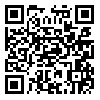Accepted Articles
Back to the articles list |
Back to browse issues page
Somayeh Shokrgozar1 
 , Arsalan Salari2
, Arsalan Salari2 
 , Fatemeh Sharifzadeh Foumani1
, Fatemeh Sharifzadeh Foumani1 
 , Elaheh Abdollahi *1
, Elaheh Abdollahi *1 
 , Ehsan Kazemnezhad Leyli3
, Ehsan Kazemnezhad Leyli3 


 , Arsalan Salari2
, Arsalan Salari2 
 , Fatemeh Sharifzadeh Foumani1
, Fatemeh Sharifzadeh Foumani1 
 , Elaheh Abdollahi *1
, Elaheh Abdollahi *1 
 , Ehsan Kazemnezhad Leyli3
, Ehsan Kazemnezhad Leyli3 

1- Kavosh Cognitive Behavior Sciences and Addiction Research Center, Department of Psychiatry, School of Medicine, Guilan University of Medical Sciences, Rasht, Iran
2- Department of Cardiology, Heshmat Hospital, School of Medicine, Guilan University of Medical Sciences, Rasht, Iran
3- Department of Biostatistics, School of Nursing and Midwifery, Guilan University of Medical Sciences, Rasht, Iran
2- Department of Cardiology, Heshmat Hospital, School of Medicine, Guilan University of Medical Sciences, Rasht, Iran
3- Department of Biostatistics, School of Nursing and Midwifery, Guilan University of Medical Sciences, Rasht, Iran
Abstract: (372 Views)
Background: Psychosomatic disorders refer to illnesses in which physical symptoms are influenced by psychological factors. Psychosomatic symptoms especially in cardiac patients can be a risk factor for increased mortality and suffering and therefore require thorough investigation.
Objective: to determine the prevalence of psychosomatic complaints and examine their relationship with attitude toward illness among clients of Noor Cardiology Clinic in Rasht in 2023.
Methods: This analytical-descriptive cross-sectional study was conducted on 187 clients of Noor Cardiology Clinic in Rasht in 2023. Data were collected using Psychosomatic Symptoms Questionnaire, the Depression Anxiety Stress Scales (DASS), and Illness Attitude Scale (IAS). Statistical analyses were performed using SPSS version 27. To assess the relationships among variables, Pearson’s correlation coefficient, independent t-test, one-way ANOVA, and multiple linear regression analysis were employed. A p-value of less than 0.05 was considered statistically significant.
Results: The average age of the participants was 42.2 years. the majority of participants were female, married, and had a bachelor's degree. 4.8% of the participants had severe psychosomatic symptoms and 31% had severe or very severe depression. Severe or very severe anxiety was reported by 25.8% and severe stress by 2.6%. The psychosomatic complaints score had a moderate positive correlation with the illness anxiety scale score (r=0.503, P<0.001) and the total DASS score (r=0.779, P<0.001), depression score (r=0.671, P<0.001), anxiety score (r=0.734, P<0.001) and stress score (r=0.721, P<0.001) had a high positive correlation. The IAS score had a low positive correlation with the total DASS score (r=0.472, P<0.001), depression score (r=0.495, P<0.001), anxiety score (r=0.471, P<0.001) and stress score (r=0.322, P<0.001).
Conclusion: The results showed that in the clients There was a significant relationship between non-organic cardiac symptoms, psychosomatic complaints, anxiety, negative attitude towards the disease, and female gender, indicating the role of psychological factors in the occurrence of these symptoms.
Objective: to determine the prevalence of psychosomatic complaints and examine their relationship with attitude toward illness among clients of Noor Cardiology Clinic in Rasht in 2023.
Methods: This analytical-descriptive cross-sectional study was conducted on 187 clients of Noor Cardiology Clinic in Rasht in 2023. Data were collected using Psychosomatic Symptoms Questionnaire, the Depression Anxiety Stress Scales (DASS), and Illness Attitude Scale (IAS). Statistical analyses were performed using SPSS version 27. To assess the relationships among variables, Pearson’s correlation coefficient, independent t-test, one-way ANOVA, and multiple linear regression analysis were employed. A p-value of less than 0.05 was considered statistically significant.
Results: The average age of the participants was 42.2 years. the majority of participants were female, married, and had a bachelor's degree. 4.8% of the participants had severe psychosomatic symptoms and 31% had severe or very severe depression. Severe or very severe anxiety was reported by 25.8% and severe stress by 2.6%. The psychosomatic complaints score had a moderate positive correlation with the illness anxiety scale score (r=0.503, P<0.001) and the total DASS score (r=0.779, P<0.001), depression score (r=0.671, P<0.001), anxiety score (r=0.734, P<0.001) and stress score (r=0.721, P<0.001) had a high positive correlation. The IAS score had a low positive correlation with the total DASS score (r=0.472, P<0.001), depression score (r=0.495, P<0.001), anxiety score (r=0.471, P<0.001) and stress score (r=0.322, P<0.001).
Conclusion: The results showed that in the clients There was a significant relationship between non-organic cardiac symptoms, psychosomatic complaints, anxiety, negative attitude towards the disease, and female gender, indicating the role of psychological factors in the occurrence of these symptoms.
| Rights and permissions | |
 |
This work is licensed under a Creative Commons Attribution-NonCommercial 4.0 International License. |




